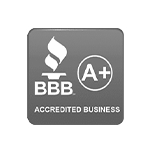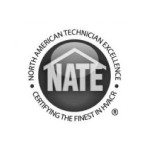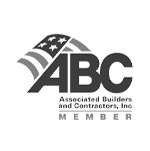Drain Cleaning in East Petersburg & Lancaster, PA
Quick & Effective Drain Clearing for the Toughest Clogs
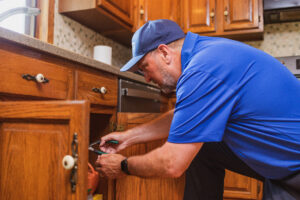 It’s not uncommon for a drain to become clogged, but if you can’t unclog it by yourself or issues keep occurring, it’s best to call a professional so they can get to the root of the problem and clean it efficiently.
It’s not uncommon for a drain to become clogged, but if you can’t unclog it by yourself or issues keep occurring, it’s best to call a professional so they can get to the root of the problem and clean it efficiently.
When a drain is slow or blocked, let Lancaster Plumbing, Heating, Cooling & Electrical clear the clog for you. Our family-owned and -operated business has served the plumbing and drain needs of local families for over a century.
For safe and effective drain cleaning, contact the Lancaster drain cleaning experts today.
Causes of Blocked Drains
Clogs can happen in the drain or anywhere in the sewer line. Your drains are under constant pressure to carry away wastewater and anything else that goes down the drain.
We’re equipped to handle blocked drains caused by:
- Food scraps
- Mineral buildup
- Hair
- Soap
- Toilet paper
- Grease or oil
- Objects dropped into the drain
- Tree roots
If only one drain is slow or blocked, the clog is generally found in that drain. However, if the drains in different areas of your home are clogged or backed up, or you have problems with recurring clogs or slow drains throughout the house, the problem may be in the main sewer line. Our plumbers are experts at detecting drain clogs in Lancaster County homes.
Signs Your Drains Need Cleaning
The biggest sign is that your sinks or showers are slow-draining. Water shouldn’t take long to drain, and if it does, there’s most likely a clog or blockage.
If your toilet overflows often, that’s another sign of a sewer problem. Water backing up most likely also means your pipes or sewer lines are clogged. Lastly, you should never ignore a bad odor coming from your drains. This likely means debris is blocking your drain.
If any of these issues are left unresolved, you could be dealing with much more complex drain repairs. Don’t wait to fix them yourself or for them to clear up because clogs won’t go away by themselves.
Safe & Effective Types of Drain Cleaning
Clogs can be caused by a variety of materials, debris, and foreign objects. We use various tools and technologies to find and eliminate clogs in any drain in your home or the main sewer line.
Every method isn’t effective for every blocked drain, so our technicians start by assessing the cause of the clog and where the pipe is clogged. Based on this information, we’ll use the most efficient method for drain clearage.
Drain Snaking
One cleaning process is cabling, also known as drain snaking. In this method, a long, thin, flexible tube is put down the drainpipe. It has a metal coil on it that’s twisted to dislodge any item or blockage that may be inside.
If you do this yourself without extensive drain cleaning experience, you may damage your pipes.
Hydro Jetting
Another common method in cleaning drain lines is hydro jetting, where a special hose is used. The hose sprays high-pressure water through the plumbing system to effectively clean the inside of the pipes.
The water is shot out in various directions at the same time so gravity can wash any excess debris down the pipes.
Drain Maintenance To Prevent Clogs
While you should never use chemical drain cleaners with harsh and corrosive chemicals, a few products are safe and effective for preventing clogs.
Bio-Clean contains natural bacteria and enzymes that safely and efficiently dissolve organic waste into water and mineral ash, which can be safely washed out of the system. Bio-Clean works to remove organic materials, such as grease, food particles, sewage, and hair.
Root intrusion is another serious problem that causes sewer line blockages. Tree roots are attracted to the moisture and grow into the line until they break the pipe. Root-X is safe and effective for killing roots without harming sewer pipes, septic systems, or vegetation growing above ground.
Choose Lancaster Plumbing & Heating for Quick Drain Cleaning in East Petersburg, PA
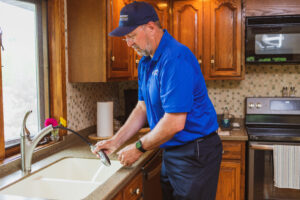
Our technicians are ready to help with your drain cleaning needs.
There are countless reasons why Lancaster Plumbing, Heating, Cooling & Electrical should be your top choice when choosing a drain cleaning company. We offer:
- Background-checked, licensed, and highly experienced technicians
- Upfront pricing and options for your project before we get started
- Exceptional customer services highly recommended by past clients
- A family-owned, locally operated team that’s invested in the Lancaster County community
Look no further than Lancaster Plumbing & Heating for sewer line inspections. Contact us to schedule service today.
Frequently Asked Questions
Common questions we receive about drain cleaning include:
To unclog a sink, you can try using a plunger to create suction and dislodge the clog. Another option is to use a mixture of baking soda and vinegar followed by hot water. If these methods don’t work, it’s best to call a professional plumber.
When used correctly, a drain snake is unlikely to damage pipes. However, if excessive force is applied or if the snake is used improperly, it can cause damage. It’s best to leave drain snaking to professionals who have the necessary experience and equipment.
There could be several reasons why a drain clogs again after it’s been cleared. It could be due to a partial blockage that wasn’t completely cleared, a deeper clog, or an underlying issue in the plumbing system. It’s recommended to have a professional plumber inspect the system and address the root cause.
To prevent drain clogs, it’s important to avoid pouring grease, oil, or food scraps down the drain. Use drain screens to catch hair and debris, and regularly clean them out. Avoid flushing non-flushable items and consider regular drain maintenance to keep your drains clear.
Minor clogs can often be cleared using a plunger or baking soda and vinegar. However, for stubborn or recurring clogs, it’s best to call a professional plumber.
How do I unclog a sink?
Can a drain snake damage pipes?
Why does my drain clog after I cleared it?
How do I prevent drain clogs?
Can I clear my drain myself?



















